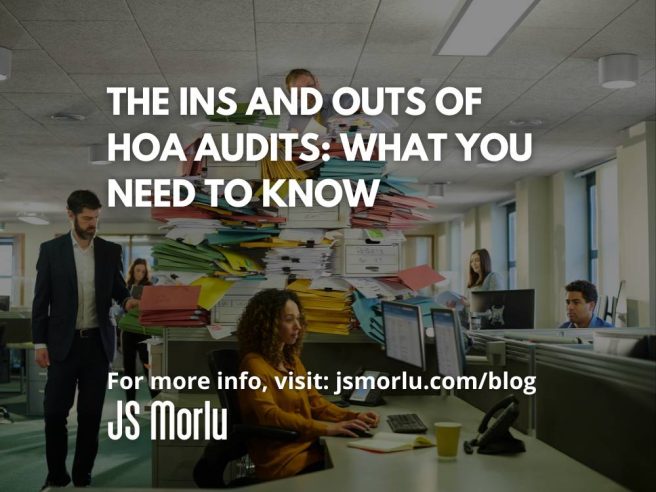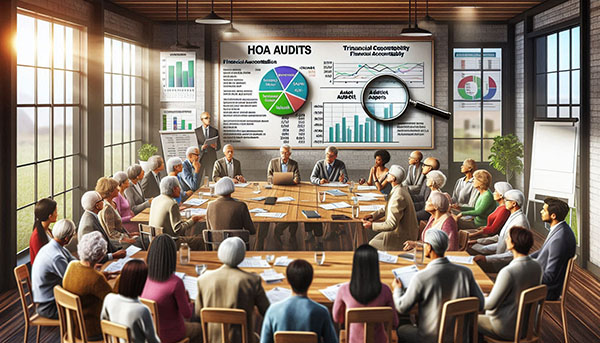By: John S. Morlu II, CPA
Homeowners Associations (HOAs) are tasked with managing community finances, but how can residents be sure their money is being handled responsibly? Enter the HOA audit, a powerful tool to ensure financial transparency and accountability. Let’s explore what HOA audits are, when they’re required, and how they work, complete with fun facts, interesting tidbits, and industry insights.
Who Decides to Conduct an HOA Audit?
Typically, the decision to conduct an HOA audit lies with the board members, either voluntarily or as stipulated in the HOA’s bylaws. However, did you know that residents in some communities can band together and demand an audit if they suspect financial mismanagement? This provision underscores the importance of resident involvement in HOA governance.
Fun Fact:
In some states, if a certain percentage of homeowners (often 10-20%) sign a petition, they can legally compel the HOA to undergo an audit, even if the board hasn’t planned one!
What Is an HOA Audit and Why Is It Important?
An HOA audit is a detailed examination of the association’s financial records to ensure accuracy and compliance with laws and governing documents. These audits are conducted by unbiased third parties—typically independent Certified Public Accountants (CPAs)—to eliminate conflicts of interest. CPAs are trained to:
- Analyze financial statements.
- Identify discrepancies or errors.
- Spot potential fraud or mismanagement.
Industry Insight:
According to the Community Associations Institute (CAI), more than 50% of HOAs in the U.S. conduct audits at least once every three years, with larger HOAs opting for annual audits due to their higher financial complexity.
The Role of the CPA in HOA Audits
When a CPA firm is hired to perform an HOA audit, they require access to a broad range of financial documents. These records provide a complete view of the association’s financial health and allow auditors to detect discrepancies, ensure compliance, and verify transactions. Below is a comprehensive list of the key documents CPAs typically review during an HOA audit:
- Board Meeting Minutes: These records offer context for financial decisions, such as budget approvals, expense allocations, and major project authorizations, helping auditors ensure spending aligns with board approvals.
- Internal Financial Statements: This includes profit and loss statements, balance sheets, and cash flow reports, which are analyzed for accuracy and consistency.
- Annual Tax Returns: Auditors verify that the HOA complies with federal, state, and local tax regulations, ensuring filings are accurate and timely.
- HOA Insurance Policies: Ensuring the association has adequate coverage for property, liability, and directors’ and officers’ insurance protects the HOA and its members from unforeseen risks.
- Bank Statements: Auditors carefully review all HOA bank accounts for unusual transactions, such as unexplained withdrawals, overdraft fees, or transfers to unauthorized accounts.
- Credit Card Statements: If the HOA uses credit cards, these statements are scrutinized to ensure all charges are legitimate, properly documented, and aligned with approved expenses.
- Invoices and Vendor Contracts: Paid and unpaid invoices, along with vendor contracts, are reviewed to verify the legitimacy of transactions and ensure services or goods were delivered as agreed.
- Payroll Records: These ensure employees or contractors are compensated accurately, taxes are withheld properly, and no unauthorized payments have been made.
- Petty Cash Records: Small cash transactions are examined to ensure they are documented correctly and align with HOA policies.
- Property Tax Records: Auditors confirm that property taxes are calculated correctly and paid on time, avoiding penalties or legal issues.
- 1099s for Contractors: Independent contractor payments are cross-checked against issued 1099s to ensure accurate reporting and compliance with IRS requirements.
- Reserve Fund Schedules: Reserve funds are analyzed to determine whether they are adequately funded and being used in accordance with reserve study recommendations.
- HOA Dues Schedules: Auditors ensure dues are collected consistently, fairly, and in accordance with the HOA’s bylaws and governing documents.
- Delinquent Account Reports: These reports detail overdue dues or assessments, helping auditors assess collection efforts and the impact on the HOA’s financial health.
- Special Assessment Records: If special assessments are levied, auditors review their calculation, approval process, and collection to ensure compliance with bylaws.
- Capital Improvement Records: Major project expenses, such as renovations or new facilities, are examined to confirm they were properly authorized and tracked.
- Utility Bills: Utility expenses are reviewed to ensure they are reasonable and align with the HOA’s financial expectations.
- Legal Expenses: Attorneys’ invoices are checked to verify the legitimacy of legal services billed to the HOA.
- Architectural Review Fees: If the HOA charges fees for architectural reviews, auditors ensure they are collected, documented, and allocated correctly.
Why Residents Should Care About HOA Audits
HOA audits benefit the entire community, not just the board. Here’s why residents should advocate for them:
- Transparency: Regular audits foster trust between the board and homeowners.
- Financial Accountability: Audits reduce the risk of embezzlement or fraud.
- Compliance: They ensure the HOA adheres to state laws and governing documents.
- Improved Management: Findings from audits can highlight inefficiencies, paving the way for better budgeting and planning.
Fun Fact:
The FBI’s Public Corruption Unit has investigated numerous cases of HOA fraud, with embezzlement schemes sometimes running into millions of dollars. Regular audits are a crucial line of defense against such crimes.
When Is an HOA Audit Required?
While some audits are conducted voluntarily, there are scenarios where audits become mandatory:
- Bylaws or State Law: Many HOA governing documents require periodic audits. Some states, such as California and Florida, have specific rules mandating audits for associations above a certain size.
- Financial Red Flags: Significant discrepancies in financial records or unexplained expenditures often trigger an audit.
- Transition Audits: When a developer transitions control of the HOA to homeowners, an audit ensures the finances are in order.
Tidbit:
In states like Nevada, HOAs managing over $75,000 in annual revenue are legally required to have their finances reviewed or audited every year. This law protects residents by ensuring financial oversight for larger associations.
The Audit Process: A Step-by-Step Overview
Here’s how a typical HOA audit unfolds:
- Preliminary Planning: The CPA firm meets with the board to understand the scope of the audit and gather necessary documents.
- Document Review: Auditors comb through financial records, looking for inconsistencies, errors, or missing information.
- Interviews: The auditor may interview board members or staff to clarify financial transactions or policies.
- Fieldwork: This includes verifying bank balances, inspecting invoices, and cross-checking dues collections.
- Reporting: The audit concludes with a detailed report outlining findings, highlighting discrepancies, and offering recommendations for improvement.
How to Encourage an HOA Audit
If your HOA hasn’t conducted an audit recently, consider advocating for one:
- Request Transparency: Ask the board to share financial statements and discuss the importance of an independent audit.
- Educate Fellow Homeowners: Highlight the benefits of audits to build community support.
- Petition for Action: If your HOA bylaws allow it, gather signatures to formally request an audit.
Conclusion: Audits as a Community Safeguard
HOA audits aren’t just financial checkups; they’re tools for building trust, maintaining accountability, and protecting the financial health of the community. Whether initiated by the board or demanded by residents, audits ensure that HOAs operate transparently and responsibly. With professional CPAs on the job and homeowners actively engaged, HOA communities can thrive with peace of mind and confidence in their financial stewardship.
Interesting Tidbit to Remember:
Think of audits as the HOA’s annual “financial fitness test.” Just as we check our health regularly, an HOA audit ensures the community’s fiscal wellbeing stays in shape!
Author: John S. Morlu II, CPA
John Morlu II, CPA, is the CEO and Chief Strategist of JS Morlu, a globally acclaimed public accounting and management consulting powerhouse. With his visionary leadership, JS Morlu has redefined industries, pioneering cutting-edge technologies across B2B, B2C, P2P, and B2G landscapes.
The firm’s groundbreaking innovations include:
• ReckSoft (www.ReckSoft.com): AI-driven reconciliation software revolutionizing financial accuracy and efficiency.
• FinovatePro (www.FinovatePro.com): Advanced cloud accounting solutions empowering businesses to thrive in the digital age.
• Fixaars (www.fixaars.com): A global handyman platform reshaping service delivery and setting new benchmarks in convenience and reliability.
Under his strategic vision, JS Morlu continues to set the gold standard for technological excellence, efficiency, and transformative solutions.
JS Morlu LLC is a top-tier accounting firm based in Woodbridge, Virginia, with a team of highly experienced and qualified CPAs and business advisors. We are dedicated to providing comprehensive accounting, tax, and business advisory services to clients throughout the Washington, D.C. Metro Area and the surrounding regions. With over a decade of experience, we have cultivated a deep understanding of our clients’ needs and aspirations. We recognize that our clients seek more than just value-added accounting services; they seek a trusted partner who can guide them towards achieving their business goals and personal financial well-being.
Talk to us || What our clients says about us






